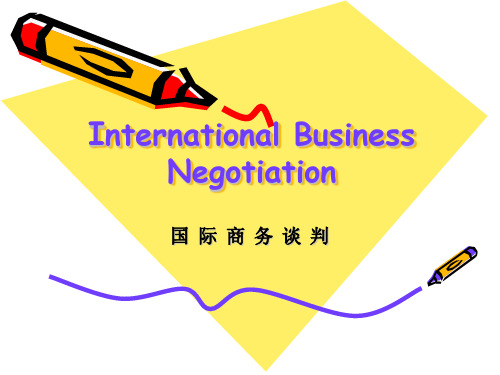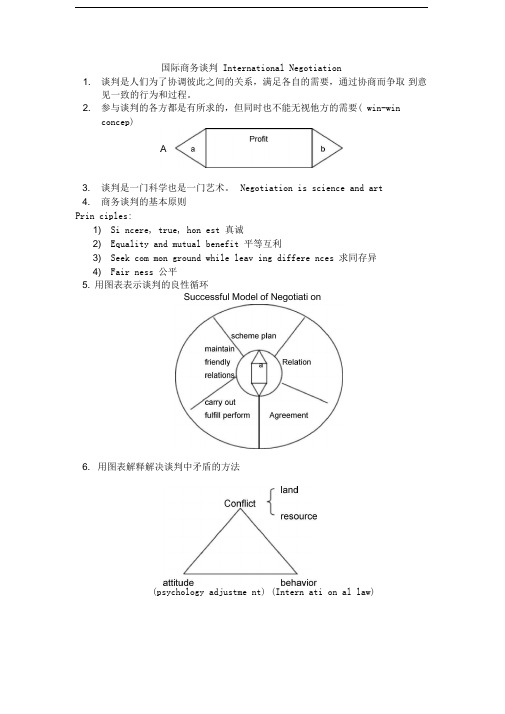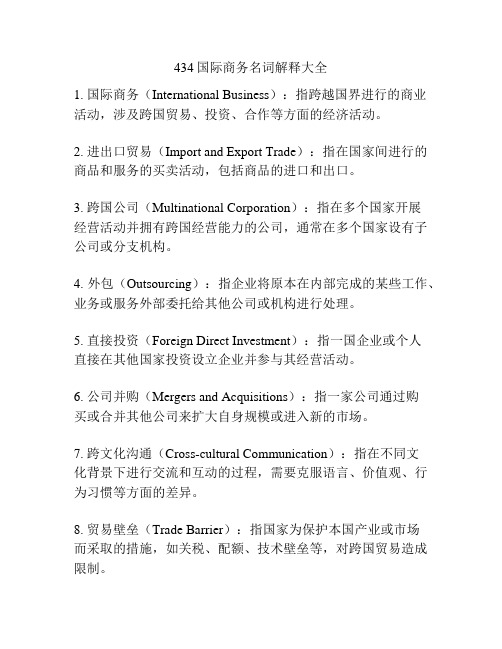International-business-negotiation国际商务沟通
国际商务谈判Chapter1InternationalBusinessNegotiation.ppt

国际商务谈判
Chapter 1 Fundamentals of International Business Negotiating
第一章 国际商务谈判概述
• 1.1 Concepts and principles of negotiation
• As the stakes in some of these negotiations are not so high, people need not have to get preplans for the process and the outcome. There are other cases like international business negotiations in which the stakes are too high to be ignored, people have to be more cautious.
Characteristics of business negotiation
• Some of the characteristics of business negotiation include:
• ① Negotiation is at the heart of every transaction and, for the most part, it comes down to the interaction between two sides with a common goal (profits) but divergent methods.
• In negotiations, both parties should know: • a. why they negotiate • b. who they negotiate with • c. what they negotiate about • d. where they negotiate • e. when they negotiate • f. how they negotiate
国际商务谈判(英文版)Chapter 1 Introduction to International Business Negotiation

9
Principle of Interest Distribution
The purpose of negotiation is to reach agreements between parties with different interests.
Any negotiations occurred at home involve 2 levels of interests:
(1)Personal Interests VS Organizational Interests
benefit (4) Items of contract should keep strictly
accurate and rigorous
5
Definition of international business negotiation
International business negotiation refers to the business negotiation that takes place between the interest groups from different countries or regions.
国际商务谈判概述

软式谈判
硬式谈判
原则式谈判
谈判对方是朋友 谈判的目标是达成协议
对方是敌手 目标是取得胜利
双方是问题的解决者
要获得有效率 友好的结 果
❖ 三 按谈判双方接触的方式来划分
❖ 1口头谈判 口头谈判是指当事人各方直接用 口头语言方式进行的谈判方式;它分为面对面 谈判和电话谈判
❖ 2书面谈判 书面谈判是指当事人各方运用函 电 互联网等方式进行的谈判
谈判双方接触的方式来划分
国际商务谈判
口头谈判
书面谈判
面对面谈判 电话谈判 函电谈判 网络谈判
二国际商务谈判的特殊性
1 国际商务谈判既是一笔交易的商洽;也是一 项涉外活动;具有较强的政策性 2 应按国际惯例办事 3 国际商务谈判涉及面广;影响谈判的因素复 杂多样 4 谈判难度大
第二节 国际商务谈判的种类
一 按参加谈判的人数规模划分
❖ 1单人谈判 也称一对一谈判;是指谈判 各方只派一名代表出席的谈判活动
一 国际商务谈判的定义
一谈判negotiation 谈判是指参与各方基于某种需要;彼此进
行信息交流;磋商协议;旨在协调其相互关 系;赢得或维护各自利益的行为过程
二商务谈判business negotiation
是指参与各方为了协调 改善彼此的经济关 系;满足贸易的需求; 围绕标的物的交易条件; 彼此通过信息交流 磋商协议达到交易目的的 行为过程
❖ 澳大利亚人一般都比较谨慎;讲究礼仪;而不会过分侵犯 东道主的权益 澳大利亚人到了日本;使日本方面和澳大利 亚方面在谈判桌上的相互地位就发生了显著的变化 澳大利 亚人过惯了富裕的舒适生活;他们的谈判代表到了日本之后 不几天;就急于想回到故乡别墅的游泳池 海滨和妻儿身旁 去;在谈判桌上常常表现出急躁的情绪;而作为东道主的日 本谈判代表则不慌不忙的讨价还价;他们掌握了谈判桌上的 主动权 结果日本方面仅仅花费了少量款待作鱼饵;就钓到 了大鱼;取得了大量谈判桌上难以获得的东西
国际商务谈判International-Negotiation

国际商务谈判 International Negotiation1. 谈判是人们为了协调彼此之间的关系,满足各自的需要,通过协商而争取到意见一致的行为和过程。
2. 参与谈判的各方都是有所求的,但同时也不能无视他方的需要( win-winconcep)3. 谈判是一门科学也是一门艺术。
Negotiation is science and art4. 商务谈判的基本原则Prin ciples:1) Si ncere, true, hon est 真诚2) Equality and mutual benefit 平等互利3) Seek com mon ground while leav ing differe nces 求同存异4) Fair ness 公平5. 用图表表示谈判的良性循环6. 用图表解释解决谈判中矛盾的方法(psychology adjustme nt) (Intern ati on al law)Successful Model of Negotiati onBargain 厂solved problemcon flictN=C=N Negotiati on7 •美国商人谈判风格1) History《The Declaration of Independence 独立宣言Immigra nt from Europe to America Open up AmericaThe spirit of develop ing AmericaCreati on2) America ns attach importa nee on Practice 实际Keep on e'promise and respect con tractsLawyers play a very important role in the negotiation. Not until they confirmeverythi ng in the con tract will they sig n it. After the agreeme nt, Americans keep it seriously.Take efficie ncy 讲求效率Before a n egotiati on, America ns will map out a pla n first, and the n carryit out step by step.与美国人谈判要尽量简明扼要,直接进入实质阶段,那些繁文缛节往往会使他们产生反感Pursue pragmatic achieveme nt and fond of ven tureThey press their goals, value efficiency and prefer to include all necessaryparts in the negotiation embracing designing, development, production,engineering, sale and price and reach a package deal3) Pers onal characteristicsSelf-c on fide ntAmerican s high individualism is manifested through their decision makingprocess -- in dividual has the right to make the decisi on. Pers onal resp onsibilityis stressed美国人个人表现欲很强,乐意扮演“硬汉”“英雄”的形象。
《国际商务谈判》课程教学大纲(工本)

《国际商务谈判》课程教学大纲一、课程基本信息课程代码:课程名称:国际商务谈判课程英文名称:International Business Negotiation学时/学分:34学时/2学分开课系(部):经济系先修课程:《市场营销》、《管理学》、《市场调查与预测》等。
面向对象:工商管理本科二、课程性质与目标《国际商务谈判》是工商管理专业的一门专业方向选修课,主要面向工商管理专业的学生。
它系统地介绍了国际商务谈判的概念、原则、内容、实务及技巧等内容。
本课程是一门综合性学科,融多学科、多方面的知识于一体,具有很强的实践性。
随着我国加入世界贸易组织和融入世界经济带来的机遇和挑战,商务谈判的实践和理论逐渐受到瞩目,对谈判理论、实务、技巧的学习己成为许多专业尤其是国际经济与贸易的学生必修的课程。
此课程旨在帮助学生理解国际商务谈判的性质特点,掌握国际商务谈判的基本原则,熟悉国际商务淡判各个阶段的谈判策略和技巧,并能够在今后的谈判实践中随机应变、灵活运用。
从而为其走上社会,为他们将来从事国际商务实践工作提供有益的帮助。
三、理论教学基本内容及学时分配(一)国际商务谈判概述。
(6课时)教学基本内容:主要介绍国际商务谈判的基础知识,包括:国际商务谈判的含义;商务谈判的特征;国际商务谈判又有哪些特殊性;国际商务谈判应遵循那些基本原则;国际商务谈判有哪些构成要素;国际商务谈判可以分成哪些类型以及商务谈判的PRAM模式是怎样的,应如何去实现。
教学重点和难点:商务谈判的内涵与定义;了解商务谈判的动因;商务谈判的特征。
(二)国际商务谈判的主要内容(自学)教学基本内容:了解国际商务谈判中合同条款谈判的基本内容及策略,掌握国际商务谈判所包含的具体要件,熟悉各种商务合同的范式,全面了解和掌握各项商务谈判谈判的主要条款内容,并能在各项谈判中把握好应着重注意和解决的主要问题。
掌握货物买卖与技术贸易等谈判的主要内容及应注意的要点或问题及工程承包、租赁、合资、合作等谈判内容的一般知识。
434国际商务名词解释大全

434国际商务名词解释大全1. 国际商务(International Business):指跨越国界进行的商业活动,涉及跨国贸易、投资、合作等方面的经济活动。
2. 进出口贸易(Import and Export Trade):指在国家间进行的商品和服务的买卖活动,包括商品的进口和出口。
3. 跨国公司(Multinational Corporation):指在多个国家开展经营活动并拥有跨国经营能力的公司,通常在多个国家设有子公司或分支机构。
4. 外包(Outsourcing):指企业将原本在内部完成的某些工作、业务或服务外部委托给其他公司或机构进行处理。
5. 直接投资(Foreign Direct Investment):指一国企业或个人直接在其他国家投资设立企业并参与其经营活动。
6. 公司并购(Mergers and Acquisitions):指一家公司通过购买或合并其他公司来扩大自身规模或进入新的市场。
7. 跨文化沟通(Cross-cultural Communication):指在不同文化背景下进行交流和互动的过程,需要克服语言、价值观、行为习惯等方面的差异。
8. 贸易壁垒(Trade Barrier):指国家为保护本国产业或市场而采取的措施,如关税、配额、技术壁垒等,对跨国贸易造成限制。
9. 跨国营销(International Marketing):指企业根据不同国家或地区的市场需求和特点,制定不同的营销策略和方案。
10. 子公司(Subsidiary):指一家公司控制或持有另外一家公司的股份,并能对其经营和决策产生影响。
11. 贸易平衡(Trade Balance):指一个国家或地区在一定时期内商品和服务的出口与进口之间的差额。
12. 竞争优势(Competitive Advantage):指企业相对于竞争对手在市场中具备的特殊优势,包括技术、创新、成本、品牌等方面的优势。
13. 供应链管理(Supply Chain Management):指企业在供应商、制造商、经销商和客户之间构建和协调的物流与信息流的整体运作体系。
外文翻译国际商务谈判(适用于毕业论文外文翻译+中英文对照)
西京学院本科毕业设计(论文)外文资料翻译教学单位:经济系专业:国际经济与贸易(本)学号:0700090641姓名:王欢外文出处:《国际商务谈判》附件:1.译文;2.原文;3.评分表2010年11月1.译文译文(一)国际商务谈判是国际商务活动中,处于不同国家或不同地区的商务活动当事人为了达成某笔交易,彼此通过信息交流,就交易的各项要件进行协商的行为过程。
可以说国际商务谈判是一种在对外经贸活动中普遍存在的﹑解决不同国家的商业机构之间不可避免的利害冲突﹑实现共同利益的一种必不可少的手段。
国际商务谈判与一般贸易谈判具有共性,即以经济利益为目的,以价格为谈判核心。
因为价格的高低最直接﹑最集中的表明了谈判双方的利益切割,而且还由于谈判双方在其他条件,诸如质量﹑数量﹑付款形式﹑付款时间等利益要素上的得与失,在很多情况下都可以折算为一定的价格,并通过价格的升降而得到体现或予以补偿。
在国际买卖合同中价格术语包括单价和总价。
单价则是由计量单位,单价,计价货币以及贸易术语构成。
例如,一个价格术语可以这样来说:“每吨CIF伦敦1500美元包含3%佣金”。
总价格是合同中交易的总额。
在谈判过程中,应该由谁先出价,如何回应对方的报价,做出多少让步才适当,到最后双方达成都能接受的协议,整个这一过程被称之为谈判之舞。
通常情况下,谈判者的目标价位不会有重叠:卖方想为自己的产品或服务争取的价格,会高出买方愿意付出的价格。
然而,有时候谈判者的保留点却会相互重叠,也就是说大多数买方愿意付出的价格都会高于卖方可以接受的最低价格,在这种议价区间的前提下,谈判的最终结果会落在高于卖方的保留点而低于买方的保留点之间的某个点上。
议价区间可以为正数,也可以为负数。
在正议价区间,谈判者的保留点会互相重叠的,即买方愿意出的最高价格高于卖方可以接受的最低价格。
这意味着谈判者能达成协议的话,那么结果肯定在这个区间之内。
负议价区间可能根本不存在或是负数,这可能会造成花费巨大的时间来做一件毫无结果的协议,谈判者将会浪费时间成本。
国际商务谈判课程教学大纲
《国际商务谈判》课程教学大纲一、课程基本信息课程编号:09010080课程中文名称:国际商务谈判课程英文名称:International Business Negotiation课程性质:专业指定选修课考核方式:考查开课专业:国际经济与贸易、电子商务开课学期:5总学时:32总学分: 2二、课程目的和任务谈判是国际商务活动的重要内容,对于国际商务活动目标的达成有着重要的意义。
国际商务谈判是理论与实践并重的课程,通过对商务谈判基本概念与相关理论的系统学习,使学生掌握国际商务谈判的基本程序,了解国际商务谈判的策略及技巧,具有进行谈判所需要的沟通能力、谈判的组织与管理能力。
三、教学基本要求(含素质教育与创新能力培养的要求)1、掌握国际商务谈判的基本概念与基本理论;2、熟悉国际商务谈判的通行惯例;3、了解国际商务谈判常用的策略及技巧4、应用所学理论、惯例设计商务谈判方案;5、培养较强的沟通能力进行谈判的组织与管理;6、培养逻辑思维能力与应变能力进行模拟谈判。
四、教学内容与学时分配第1章国际商务谈判概论(4学时)商务谈判的概念、特点与种类;商务谈判的原则;商务谈判的价值评价标准;国际商务谈判的概念、特点及程序。
第2章商务谈判的有关理论(4学时)当代主要谈判理论概述,谈判的需要理论,价值谈判理论,谈判的空间理论,谈判的其他理论。
第3章国际商务谈判的准备(6学时)谈判人员的组织,谈判信息的收集,谈判方案的拟定。
第4章国际商务谈判过程中的策略技巧(8学时)开局阶段的策略技巧,报价磋商阶段的策略技巧,达成协议阶段的策略技巧。
第5章商务价格谈判(3学时)影响价格的因素分析,正确处理价格的各种关系,国际技术贸易的价格谈判。
第6章国际商务谈判中的风险与规避(3学时)国际商务谈判活动的风险识别,风险控制与管理的手段与策略。
第7章跨文化商务谈判(4学时)跨文化商务谈判与谈判风格,日本人、美国人的谈判风格,欧洲人的谈判风格,阿拉伯人的谈判风格,拉美人的谈判风格。
Chapter 2.International Business Negotiations ppt国际商务谈判
有关货物价格、付款、货物 质量和数量、交货地点和时 间、一方当事人对另一方当 事人的赔偿责任范围或解决 争端等等的添加或不同条件, 均视为实质上变更发价的条 件。
Step 4-Acceptance
Articles18 (1), (2), (3) in Chinese: Article 18
(1)被发价人声明或做出其他行为 表示同意这一项发价,即是接受。 缄默或不行动本身不等于接受。
3. Persuasion (more or less)
Americans more Japanese little persuasion is necessary
4. Concessions and agreements
Americans throughout the negotiation Japanese all at the end of negotiation
Negotiating Styles I. Graham’s four stage model
1. Non-task sounding sound: v. try (especially cautiously or in a reserved manner) to learn sb’s views, sentiment, etc. (尤指小心含蓄地)试探他人的观点、意见等。 Business or Relationship first?
4. Protocol/Etiquette informal vs formal-gift giving, entertainment, seating arrangements, numbers of negotiators, timing of breaks, duration of negotiation. munication verbal vs non-verbal communication 6. Nature of persuasive argument empirical information and rational arguments
国际商务谈判概述
国际商务谈判的主要特征
商务谈判中双方利益追求受一定的利益界限的约束。 商务谈判各方最终获利的大小,取决于谈判各方的实力和谈判能力。 商务谈判注重合同条款的严密性与准确性。
(二)国际商务谈判的特殊性特征
跨国性 政策约束性 文化差异性 因素的复杂性 内容的广泛性 人员素质的严格性
第二节 国际商务谈判的地位与功能
导入案例
如果两个孩子充分交流各自所需,或许会有多个方案和情况出现。可能的一种情况,就是遵循上述情形,两个孩子想办法将皮和果肉分开,一个拿到果肉去喝汁,另一个拿皮去做烤蛋糕。 然而,也可能经过沟通后是另外的情况,恰恰有一个孩子既想要皮做蛋糕,又想喝橙子汁。这时,如何能创造价值就非常重要了。 要整个橙子的孩子提议可以将其他的问题拿出来一块谈。他说:“如果把这个橙子全给我,你上次欠我的棒棒糖就不用还了”。其实,他的牙齿被蛀得一塌糊涂,父母上星期就不让他吃糖了。 子想了一想,很快就答应了。他刚刚从父母那儿要了五块钱,准备买糖还债。这次他可以用这五块钱去打游戏,才不在乎这酸溜溜的橙子汁呢。
单击此处添加大标题内容
何谓商务谈判? 所谓商务,是指经济组织或企业的一切有形资产与无形资产的交换与买卖事宜
商务谈判是指企业为了实现自己的经济目标和满足对方的需要而进行相互协商和沟通的过程。
商务谈判是商务活动的重要内容,是商务活动的基础和核心,贯穿于商务活动的全过程。 首先,商务谈判是商务活动的起点。 其次,商务谈判过程是实现商务活动目标的过程。 再次,商务活动当事人的权利和义务主要通过商务谈判加以明确和界定。 最后,商务活动过程也是维护和实现商务谈判成果的过程。
(三)按商务谈判的地点划分
主场谈判。是指某一方谈判方以东道主身份在自己所在地进行的谈判 。 优点 ——易于建立心理优势 ——可以以礼压客 ——可以同时在谈判场内外展开 活动
- 1、下载文档前请自行甄别文档内容的完整性,平台不提供额外的编辑、内容补充、找答案等附加服务。
- 2、"仅部分预览"的文档,不可在线预览部分如存在完整性等问题,可反馈申请退款(可完整预览的文档不适用该条件!)。
- 3、如文档侵犯您的权益,请联系客服反馈,我们会尽快为您处理(人工客服工作时间:9:00-18:30)。
International business negotiation——To be a qualifiednegotiator姓名:学号:专业班级:To be a qualified negotiatorToday’s globalization requires professionals to deal with their counterparts in countries with different economic, cultural, legal, and political environments. You may need to resolve a dispute with a supplier, finalize a counter proposal for a state-owned enterprise, or lead a multicultural team. Thus in a globalized market, few subjects are as critical as negotiating across cultural boundaries. When negotiators are from diverse culturally sensitive negotiating skills are necessary for managing in an international setting. So, it needs we deal with carefully and keenly.As we know, if you want to be a good international negotiator you should prepare well before start the negotiation.The most important thing is to collect information. Such as: the background, corporate culture and management method of the target co. you will negotiate with. Because all these aspects will be closely related to their offer, their way of doing business, even the strategy they will adapt in a negotiation. In addition, know the people well who will attend in the negotiation by all possible means. Pay more attention to their negotiation style: task-oriented or people-oriented? Their ways of handling things, directly or indirectly? High-context or low-context? The philosophy they stickto, win-win one or the win –loss one? And if possible, know about their personalities which may affect the going of the deal to a certain extent.Apart from that, you should spare some efforts on your own part, this may include: set up your objectives clearly. Always keep what you want to achieve in mind, work out a strategy (according to their possible tactics), distribute the roles appropriately, when doing this; you should be clear about different people’s characteristics. Last one; be ready to cooperate with other members in a team. Different people may have different perspectives and views to different things and in a negotiation they play different roles and have certain emphasis. So be cooperative is rather critical for a successful negotiator.1. Target decisionPerhaps the most important part of pre-negotiation planning is determining, with some precision, the negotiation objective that need to be achieved. A buyer cannot go into a negotiation with vague objectives such as ‘to get the price down or “to do the best I can”. A buyer must go further than this and establish a negotiation objective for each agenda item that he intends to raise.2. Collecting informationThe first step you should do is that you must make sure which kind of information you need.Then, we can use the following way get some important information.(1)international organizations;(2)governments;(3)service organizations;(4)directories and newsletters;(5)on-line service;(6)local laws and regulations;(7)information on financial credit;(8)market survey.3. Staffing negotiation teamsGenerally speaking, a negotiation team consist of a team leader or chief negotiator, and an interpreter if it is a bilateral negotiation, and a note keeper. Other key members of the team include professionals and experts representing their special fields, such as production, sales promotion, technology, financial accounting, engineering, law and other areas concerned with a specific negotiation, counting, engineering, law and other areas concerned with a specific negotiation.4. Choice of negotiation venuesGenerally speaking, negotiation sites can be divided into three categories host venue, guest venue and third party’s venue. You can according the situation and then choose right place. A careful consideration and arrangement for the preparatory work cansave a lot of time and resources for negotiators.5. Communicate in negotiationMuch of what people communicate to one another is transmitted with nonverbal communication. Examples include facial expressions, body language, head movements, and tone of voice, to name just a few. Some nonverbal acts, called attending behaviors, are particularly important in connecting with another person during a coordinated interaction like negotiation; they let the other know that you are listening and prepare the other party to receive your message. We discuss three important attending behaviors: eye contact, body position, and encouraging.6.The Case study of Cultural Difference Of Nonverbal CommunicationAnother most important factor which affects the success of business negotiation is cross-cultural communication.The study of cross-cultural communication includes language communica tion and non-verbal communication.People usually pay attention to verbal communication in general during communication.They believe that language is the only way to transmit and compre hend information,while ignoring the importance of non-verbal communication.This paper attempts to introduce the basic ideas of non-verbal communication and apply relevant principles to account for some cross-culture business negotiation skills through case studies.This paper aims to make people understand the importance of non-verbal communication and the non-verbal language difference which is influenced by different social ba ckgrounds so as to avoid business negotiations failure.Then i want to share with you some case about culture different: Case1:The Culture Difference of Body LanguageAt an international airport in an Arab country,a Chinese engineer wanted to express his appreciation attitude while che cking the luggage.As he knew no Arabic,the only way for him was to shake hands with the officer.Both of the engineer’s hands were full—his left hand was holding a small traveler’s bag and his right hand a pi ece of luggage.For the sake of convenience,the engineer quic kly put the bag into his right hand and extended his left oneto the officerhe was expecting a hand shake with the officer.Something happened unexpectedly.The officer’s smiling face turned pale and the smile disappeared at once. Instead of a courteous handshake,he slapped that engineer’s extended hand and walked away.Analysis:Personal body movements and facial expressions c an convey information which sometimes can cooperate with the l anguage,and sometimes even can replace the language to conveyinformation.What is wrong with the Chinese engineer in the c ase above?The point is that:he extends his left hand the Ara b officer for a handshake.What that engineer do not know is t hat,in Arab culture,left hand is dirty,and it is regarded a s an insult if someone uses it for a handshake.It is true that a business person could not have a complet e knowledge of all other culture and customs.However,as a bu siness person,he should learn as much as possible.Actually, more and more Western business magazines and journals have bec ome more and more interested in study on cultural differences and teaching their business people how to behave accordingly i n another culture.People of different cultures will have different understan ding about body language.Business Communication is not only t he exchanges and cooperation in the economic field,but also t he exchange and communication between cultures,and cultural f actors always play a crucial role.The same movements or expre ssions in different cultures may stand for different meaning. For example,Americans use thumb and index finger to make a ci rcle instead"OK"as a symbolic gesture.But,in Japan,it is s tand for"coin",the shape of"money".So in Japan the gesture means the money.In France,in most cases,the gesture means"zero"or"no value".Use the same gesture on the same occasi on can means different kinds of meaning in different culture and cause different kinds of responses.The same gesture,the Americans means"OK";the Japanese means"money",they want to know something about the price;French means"no value".In a word,in the process of business communication businessmen sh ould know some cultural habits to avoid unnecessary misunderst anding.Case2:The Cultural Difference of ParalanguageSome Japanese businessmen went to the United States for a large trade negotiation.At the beginning of the negotiations, U.S.representatives spoke a lot.They want to reach an agree ment quickly.However,the Japanese representatives kept silent.When the U.S.representatives try to talk with the Japanes e,these American managers confused and felt frustrated.Becau se the American managers sometimes just got a"Hay"or a nod a s the answer,even sometimes they got nothing but the silence. Finally,the U.S.manager concluded:"The Japanese do not wan t to do business with us.They are so rude,they even do not ha ve a willing to talk with us!"This trade negotiation ended w ith failure.Analysis:More often the American-Japanese business communication runs into a loop:the more the American talks,the-mor e silent the Japanese will be-they need time to digest what th e American has just said;and the more silence the Japanese re spond with,the more the American will talk.For those America n managers,perhaps the saying“enough is enough”is the be st expression to describe their irritated feeling or frustrati on.This helps to explain why the American manager in the case above finally said:"The Japanese do not want to do business with us.They are so rude,they even do not have a willing to talk with us!"What makes the American-Japanese business communication r uns into such a loop is the cultural difference of the two cou ntries.They have different understanding of silence.American s believe an eloquent speaker is regarded as a good communicat or.For that reason,many Americans assume that one should be eloquent,and this should be the standard applicable everywher e in the world.However,what they do not know is that such a standard does not fit into the Japanese context.The Japanese culture,on the contrary,takes silence as an earnest way to t hink about what others have said(or are saying).Moreover,Ja panese distrust“speakers”.As the proverbhe who knows does not speak,and he who speaks does not know.That’s the reason why many Japanese often remain silent or pause for a long time before they say anything.As far as silence i s concerned,Japanese have all kinds of silence,each of which carries different meanings.And this is something many Americ an managers have little knowledge about.In a word,we must pay attention to the turn-taking skills during business conversation.In English-speaking countries, silence is the worst response during the communication.Becaus e they believe response is a expression of respect and attenti on.We must use non-verbal signals from time to time to mainta in a context with others during business communication.7. The necessary qualities a negotiator should have,such as:(1).Patience.(2).Self-control ability.(3).Listen carefully.Finally, we need to do a lot more to make us a successful negotiator, the above words are far less enough. But they can be seen as a guide and the direction for us. “Where there is a will, there is a way.” If only we set up our mind and spare no effects, nothing is impossible in the world, so does “be a successful negotiator come on!”【Reference】[1]Roy J. Lewicki & Bruce Barry & David M. Saunders. international business negotiation[2]Claude Cellich & Subhash C. Jain. Practical solutions to global business negotiations[3]白远.国际商务谈判欢迎您的下载,资料仅供参考!致力为企业和个人提供合同协议,策划案计划书,学习资料等等打造全网一站式需求。
